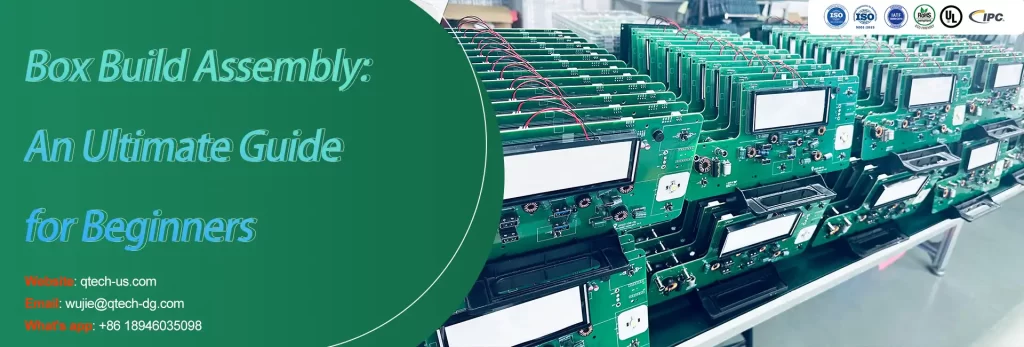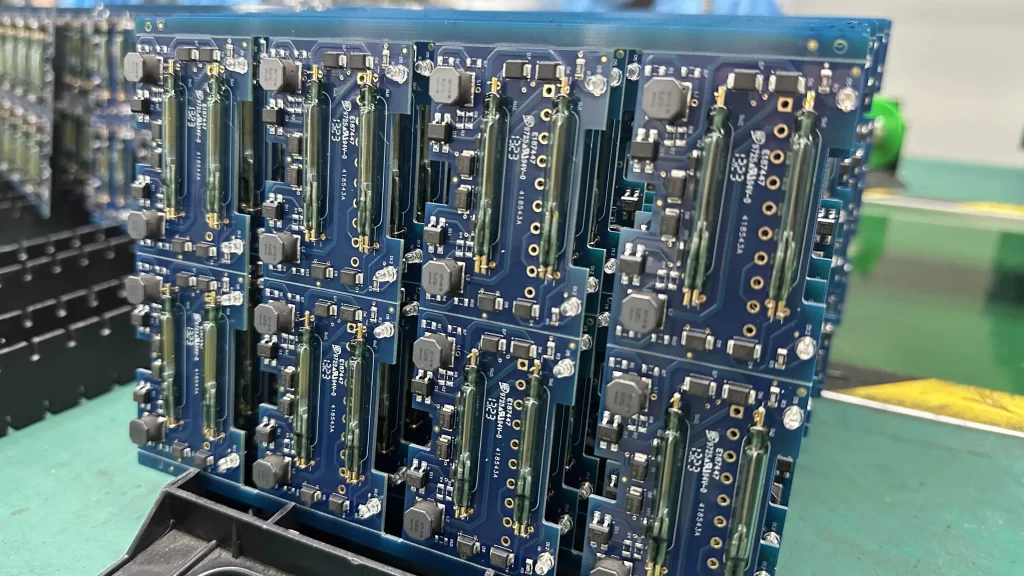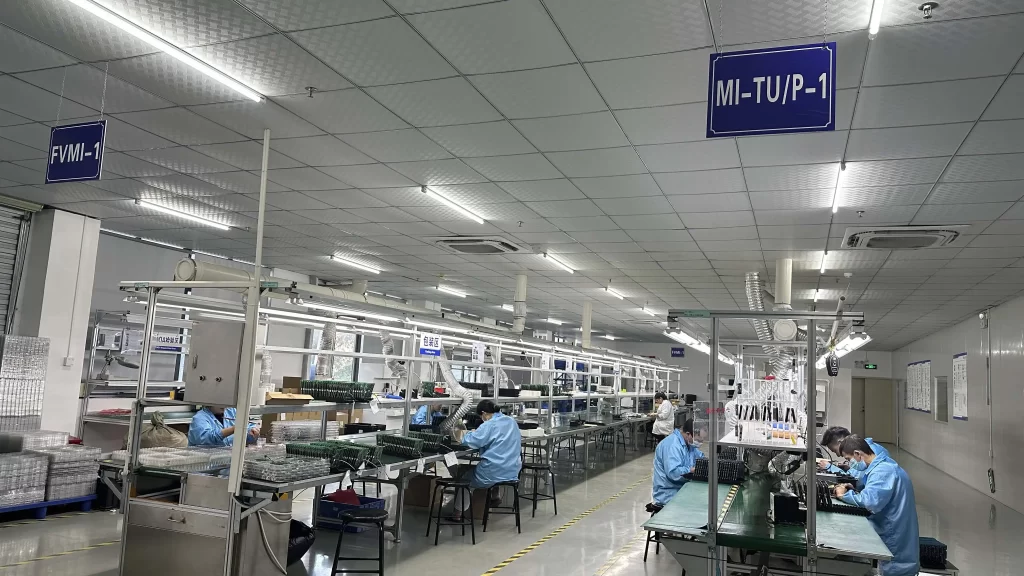
For beginners who have just stepped into the electronics manufacturing industry, you will likely encounter the term “box build assembly” as an important concept. Box build assembly is crucial to the assembly of electronic products, it enables different components to be efficiently integrated in one housing to form a complete product. Mastering the process of box build assembly will greatly simplify the complexity of product assembly, reduce costs, and improve yield and quality.
In this article, we will provide you with an in-depth guide, including the definition of box build assembly, common service types, process, and more. Hope that with the help of this guide, you can have a systematic understanding of box build assembly.
Box build assembly refers to the process of assembling, integrating, and testing various electronic components and modules into a fully functional product inside an enclosure or “box”. It involves taking printed circuit boards loaded with components (known as PCB assemblies), interconnecting them with wiring harnesses, and adding in power supplies, connectors, electromechanical parts like switches and sensors, and other hardware. All these pieces get assembled and mounted into frames or enclosures made of metal or heavy-duty plastics that can withstand demanding physical environments.
The end result of the box build process is a completely assembled electronic product unit that is ready for integration into the final application, such as medical devices, industrial control systems, telecom equipment, and many other electronic products we use daily. Box build assembly requires collaboration between design engineers, sourcing specialists, and manufacturing technicians to take a product from initial concept through prototyping, testing, pilot runs, and final mass production.

Printed Circuit Boards (PCBs) – The core circuit boards that contain the product’s electronics and components. May include main controller boards, peripheral boards,power supply boards,etc.
Power supplies – Transform and regulate voltage levels to power the system. Can be AC-DC converters, DC-DC converters, or custom power supply modules.
Wire harnesses and cables – Interconnect PCBs and devices. May have connectors, terminals or splices. Often custom designed for the product.
Electromechanical parts – Switches, relays, buttons, sensors, motors, louvers, and other mechanical/electrical parts.
User interface components – Displays (LCD, LED segments, OLED), keypads, touch screens, buttons, switches, lights, speakers.
Housings and enclosures – Protective metal or plastic boxes that surround internal components. Can be custom fab or off-the-shelf.
Hardware – Nuts, bolts, stands, brackets, rails that mount and position components within the enclosure.
Battery packs – Rechargeable lithium or custom battery packs that are used as backup power source.
Heatsinks and fans – Dissipate heat generated by high-power components. Passive heatsinks or active fans.
Connectors and cabling – External connections for data, power, peripherals, antennas, etc. Common types are USB, HDMI, RJ45, DB9.
Custom shielding – Metal shielding for EMI/RFI protection or sectioning high/low voltage areas.
The specific components vary widely based on the product’s applications.
Using a box build assembly approach offers several benefits, especially when compared to assembling products using separate components or in-house manufacturing. The key benefits include:
Simplified Supply Chain Management
One big advantage of box build assembly is streamlining your supply chain. Instead of managing a bunch of different vendors sending you individual components and subassemblies, you’re sourcing a complete, ready-to-go product from just one supplier.
Save Time and Money
Outsourcing box build assembly streamlines production and reduces costs. Instead of handling multiple vendors, assembly, testing, and quality control processes separately, you streamline these activities by relying on a single provider.
Expertise and Specialization
Rather than trying to master the many intricate assembly and test processes yourself, you can lean on the assembler’s seasoned knowledge. Take advantage of the skills they’ve perfected over years of box build production. Their engineering teams have tons of experience to ensure a high-quality end product.
Ensure Quality
Reputable box build assembly providers maintain strict quality control. This can result in a higher-quality final product since the provider focuses on consistent assembly and thorough testing.
Scalability
A great advantage of using a box build assembler is their flexibility to scale production up and down. For both small prototype batches or massive production runs, reputable assemblers have the capabilities to manufacture any number you need. With extensive facilities, advanced equipment, and skilled staff, they can handle any quantity of box build assembly. They can easily adapt to produce exactly the volume you need when you need it.

The box build assembly process involves the assembly of electronic products or systems into their final enclosures or “boxes.” This process can vary depending on the complexity of the product and the manufacturer’s capabilities, but here is a general outline of the box build assembly process:
Provide detailed documentation: Have comprehensive documentation like schematics, BOM, mechanical drawings, assembly instructions, test specifications, etc. to avoid ambiguities.
Design for manufacturability: Seek design guidance from your EMS partner early on. Design choices affect ease of assembly, cost, quality, and lead time.
Use standard components when possible: Opt for common, off-the-shelf parts rather than custom components where feasible to aid procurement and quality.
Rationalize BOM to avoid obsolete parts: Review the bill of materials regularly and design out soon-to-be obsolete parts to avoid scrambles.
Plan for quality control: Implement incoming inspection, in-process checks, automated testing, and other quality procedures with clear accept/reject criteria.
Validate builds with prototypes: Prototype initial box builds to validate the design, manufacturing processes, and test coverage before full production.
Communicate schedule requirements: Provide forecasts of expected demand and lead time targets to your EMS partner early in the process.
Visit the EMS facilities when possible: See firsthand their production capabilities, quality control, and automation to gain confidence.
Look for companies with proven experience assembling products similar to yours in complexity and volume. They should have expertise in the required production techniques.
Tour their production facility to see their assembly lines, test equipment, supply chain processes, etc. firsthand. Ensure they can handle your product’s components, technologies, and quality standards.
Look for ISO certifications, FDA registrations, and other credentials indicating they follow strict quality systems and processes. Make sure they meet all regulatory and compliance requirements.
Reach out to current and past customers to hear directly about their box build experience, quality, responsiveness, and communication.
Look for rigorous quality control procedures during assembly such as in-process inspections, automated optical testing, end-of-line functional testing, etc.
Make sure they have systems and staff dedicated to project management, schedule coordination, change management, and regular client communication.
Examine how they manage their supplier network, component inventory, procurement, and logistics to avoid part shortages.
Get detailed quotes for assembly, tooling,NRE, and components to compare overall value proposition across providers.
Qtech is a leading electronic manufacturer in China, with nearly 20 years of experience in electronic assembly. Our team has extensive expertise and know-how to carry out a box assembly project efficiently. We are fully capable and equipped to handle all aspects of the build process smoothly. If you are seeking more information about this crucial technique or if you would like to receive a quote for our box build assembly service.